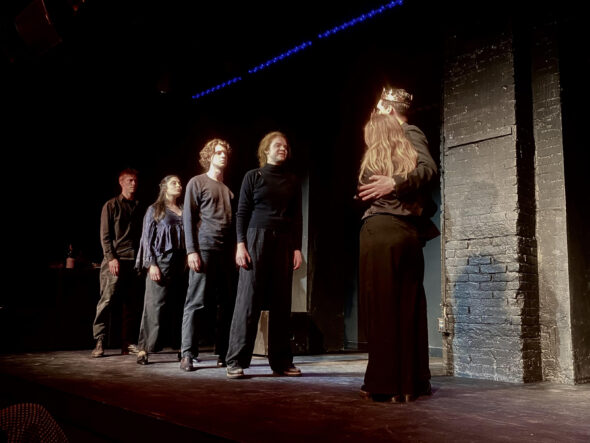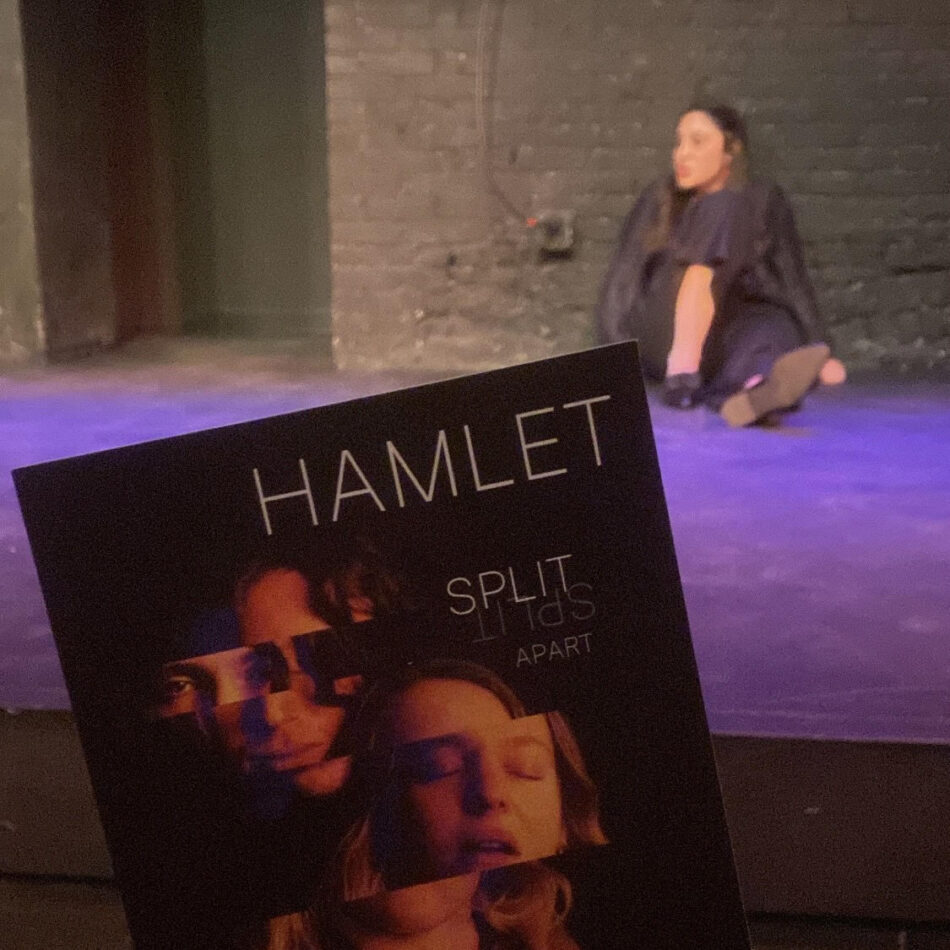Hamlet is a story that most learn when they’re young and many come to love. Interpretations are plentiful. A small production of Lee Strasberg graduates looks at the 17th-century play through a psychoanalytic lens.
It’s the third play actress Emma Tadmor, 25, is directing, the first that she didn’t write. It’s a story we’ve all heard before. It’s Shakespeare. But it’s different: Hamlet, Split Apart. Tadmor gives us four Hamlets, and all in under an hour.
It was a broken heart that first inspired her to write. It was 2021, the midst of the pandemic, and she had never written a play before. Within a few short months that play, Plasters, premiered at The Edinburgh Festival Fringe, the world’s largest performance arts festival. Tadmor starred in and directed her play. The blonde 5 foot 2 25-year-old learned how to earn respect and control a room of actors. Her second original, Charlie, premiered in New York’s Theater Lab in 2022. For Hamlet Split Apart the young woman revisits the roots of her career on stage.
Tadmor, who grew up in Israel, fell in love with acting – and Shakespeare – in London. About to start her educational path into what she would call a stable career – law or business – she decided to give acting a try. To rule it out, really. She signed up for a workshop where her first role was Hamlet’s Ophelia. She did the program to get it, acting, out of her system, as she said. But the opposite happened. She fell in love with the craft and followed an acceptance to Lee Strasberg in New York City, not knowing it was one of the most renowned acting schools in the world.
An ensemble of Strasberg graduates and students, the cast set out on a journey to see what kind of people would act the way Shakespeare’s infamous characters do and why.
Adapting a script created by Gary Ladgen, Tadmor and co-director Roni Ishay created a complex portrayal of Hamlet. The protagonist is being portrayed by two actors and two actresses, Diana Salina, Rupert Fennessy, Bella Kouds, and Patrick Alwyn. Working closely with Noa Zaron, a clinical psychologist specializing in personality disorders, the women explored the character as suffering from Dissociative Identity Disorder (DID, formerly known as Multiple Identity Disorder).

Director and actress Emma Tadmor walking off stage.
Who is Hamlet to you?
Hamlet, whom I love dearly by the way, is a narcissist who grew up with a very borderline personality mother who is neglected and emotionally abused as a child and who struggles to find his place in the world.
There’s something really relatable about him. Obviously, most of us are not the Prince of Denmark, and our father wasn’t murdered by our uncle and he didn’t marry our mom. And we also don’t want to sleep with our mother consciously. But I always looked at him as a kid whose parents got divorced and he doesn’t like his mom’s new partner.
What makes you call him a narcissist?
A wonderful friend of mine who’s a clinical psychologist is advising on the script.
If you break this down, narcissism is basically a combination of defense mechanisms. Defense mechanisms, when they’re healthy, are a good thing. Just for narcissists, they’re not healthy. They’re put into place because they’re so sensitive at their core. So raw and so fragile and so volatile and so emotional and so combustible even, that all these walls have to get put up. And then you’re dealing with this horrifying creature.
And how is that your Hamlet?
I’m looking at him as though he has split personality disorder. To me, Hamlet feels helpless. He can’t do anything. He doesn’t have agency over his life. He feels like he can’t do anything and needs to control something. But all he can control is himself and that is not enough.
That would build a foundation for someone who could then develop DID [Dissociative identity disorder]: “Ok, I need to control more than one person. Here’s my army. I have three more soldiers. Go!” It’s this thing of protecting and controlling and commanding. But when you give away control, you give away control. It doesn’t give you more power, it gives you less.
As each of them dies through the players, each of them tries to take the lead and fails.
And how does he split?
The reason that you separate is that one thing that you feel can’t exist with another thing that you feel. The part of Hamlet that is sexually attracted to his mom can’t exist with the part of Hamlet that needs her to hug him like a baby. They can’t co-exist.
Was it a conscious choice to have two women and two men play Hamlet?
I was originally going to have three women and one man. Not even in the sense of gender equality — sorry to not be PC about it. There are aspects of Hamlet that are really feminine.
A lot of Shakespeare’s characters, when they’re male, they’re very male. Hamlet is more than that.

Hamlet number four (Patrick Alwyn) and his mother, Queen Gertrude (Emma Tadmor)
So who’s who?
Diana to me has the most raw, emotional, vulnerable, angry, hurt, childlike, part of him.
Bella’s Hamlet specifically, if she were an archetype, she’d be a mafia boss. He bosses all the others around. She has the best part of Hamlet in my opinion. Not the best — she has the part that I would most like to play.
Patrick is Hamlet number four, and Rupert to me is most of the narcissism in Hamlet. But he’s also, in a way — and we found this through improv, which is really interesting — the most mature out of him. He’s the only one who’s obsessed with his girlfriend, not his mother.
Hamlet four is insane. He’s so scary. He’s the one who almost raped his mother. He’s the one who kills people. He’s really, really scary and there’s so much pain. I don’t think that that pain is something that we associate with narcissism, but it’s so much a part of what it is.
And you’re playing both of these women – why?
Hamlet’s relationship with Ophelia is very much affected by how he feels toward Gertrude. I see a correlation between the aggression that he starts to show toward Ophelia and how he feels about his mom. He is completely confused as to which woman he’s speaking to.
Hamlet doesn’t know who he’s talking to when he chokes Ophelia or grabs her. It’s very much about Gertrude, the whole way he treats her. He can’t yell at Gertrude, so he yells at Ophelia. He can’t hit Gertrude, so he hits Ophelia. He later also hits Gertrude, but in the beginning, he can’t. So I see a lot of connections between the two of them, for him.
What’s his relationship with Ophelia, his girlfriend, like?
We talked about this in rehearsal, about whether Ophelia’s a virgin, about whether or not they’re having sex. And if not, why? I think that they’re not and the reason is Hamlet. I don’t think the reason is Ophelia at all.
He’s seen his father be sexually aggressive with his mother growing up. He sees his uncle now with his mother and she’s becoming this very promiscuous, very sexual being right in front of him. And it’s grossing him out. As it should.
Honestly, he’s a kid. He’s not, he’s 30. But in his mind, he’s a kid.
He’s fascinated with his mother’s sex life. And that can’t have anything to do with Ophelia.
How does that affect their relationship?
There’s this part in the play where it’s right in between Rupert and Diana’s Hamlet. He sees his uncle and Gertrude intimate with each other. Later Hamlet barges into Ophelia’s room, grabs her, holds her, doesn’t speak, doesn’t say a word, examines the girl, and walks away.
He’s completely obsessed with this idea of women being pure. She has to be pure. Sex ruins you. “Sex makes you not pure, so I won’t touch you.” And how maddening is that for a girl? You grow up — as I’m sure most of us have, and as I’m sure Ophelia did — hearing that you must be careful. You cannot be in a closed room with guys because all they want is sex. And then you get in a closed room with a guy that you’re dating who’s older and experienced. And he doesn’t wanna touch you. What do you think about yourself? What does that do to you?
And everyone around her keeps calling her pretty, the whole thing. Who decided that she’s pure and virginal and pretty and destined to be a bride and all these things? She might be pretty. So what? So she’s being told that she’s attractive and then she gets into a room with a man and he doesn’t touch her and she wants him to. Wouldn’t you go crazy? I would. She’s just a poor girl.
Who is Ophelia to you?
A really, really, really strong woman who grew up in a time when she couldn’t do anything she wanted to do. She’s the only sane character in this play. Which is crazy because she’s the one who goes crazy. She’s mad and she has a mad scene. But no: she’s actually totally sane.
She has a psychotic break because everyone around her – it’s this terrible gaslighting, abusive relationship. That existed then as much as it does now and it’s wild.
If she’s anything, she’s a soldier and people just break her.
How do you learn to differentiate between the roles?
It took me a while because I’m also directing, so I was very involved with the other actor’s character-building process.
I played Ophelia before, so I was convinced that I knew who she was. I was wrong. Not wrong, but who she was to me five years ago is not who she is to me today. Because I’m not who I was five years ago.
Gertrude was really hard for me to find in the beginning. She’s a mom and I’m not. I don’t necessarily know that I like her. I had to find how to love her and still behave in ways that I, Emma, would find okay to behave.

All four Hamlets – Diana Salina, Rupert Fennessy, Bella Kouds, and Patrick Alwyn – backing Hamlet number one confronting King Claudius (Charlie Howard) and Queen Gertrude (Emma Tadmor).
How did you do that?
I found a reason for Gertrude to be the way that she is. When you find a reason for someone to be the way that they are, you can’t judge them anymore. She’s lived through something that I haven’t lived through. Thankfully. I don’t know how I would’ve turned out if this had happened to me.
I can read, I can research. I can imagine. I can connect her to my life as much as I can, but I can’t judge her. She’s not a bad person. She does bad things but she’s not a bad person.
I see myself in Ophelia a lot. And she’s harder for me to play because of that. Because it asks you to be so honest.
The moment I started looking at them like both of them exist inside of me in a way, it got much easier. And I do different accents to distinguish between them.
You’re a 25-year-old, small, blonde woman from Israel who moved to New York to become an actress. Now you’re putting on your third play, directing and acting in both the female leads — do you ever feel impostor syndrome?
Always! Sometimes in the middle of the night where I just start laughing. Like, what am I doing?
I feel the need to crawl under my blanket. And start not even crying, just laughing because I think this is ridiculous.
If I feel fine, it’s because I’ve decided that this is nothing. It doesn’t matter. It’s just a play. Who cares? It’s New York, but it could be anywhere else. Off-Broadway. Doesn’t matter. We’re a bunch of friends doing a play.
The production of Hamlet premiered at The Flea Theater in downtown Manhattan on May 3rd, 2023. The next performance will be on May 31st, followed by three performances in June.


